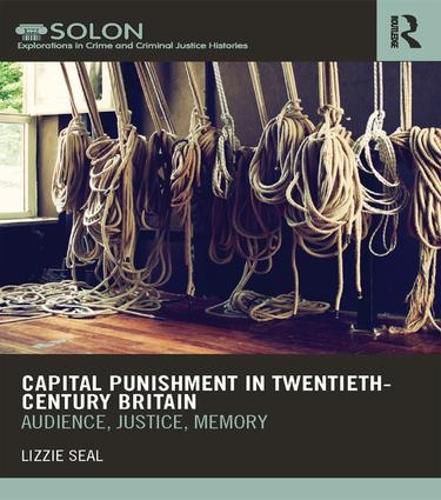Readings Newsletter
Become a Readings Member to make your shopping experience even easier.
Sign in or sign up for free!
You’re not far away from qualifying for FREE standard shipping within Australia
You’ve qualified for FREE standard shipping within Australia
The cart is loading…






Capital punishment for murder was abolished in Britain in 1965. At this time, the way people in Britain perceived and understood the death penalty had changed - it was an issue that had become increasingly controversial, high-profile and fraught with emotion. In order to understand why this was, it is necessary to examine how ordinary people learned about and experienced capital punishment.
Drawing on primary research, this book explores the cultural life of the death penalty in Britain in the twentieth century, including an exploration of the role of the popular press and a discussion of portrayals of the death penalty in plays, novels and films. Popular protest against capital punishment and public responses to and understandings of capital cases are also discussed, particularly in relation to conceptualisations of justice. Miscarriages of justice were significant to capital punishment’s increasingly fraught nature in the mid twentieth-century and the book analyses the unsettling power of two such high profile miscarriages of justice. The final chapters consider the continuing relevance of capital punishment in Britain after abolition, including its symbolism and how people negotiate memories of the death penalty.
Capital Punishment in Twentieth-Century Britain is groundbreaking in its attention to the death penalty and the effect it had on everyday life and it is the only text on this era to place public and popular discourses about, and reactions to, capital punishment at the centre of the analysis. Interdisciplinary in focus and methodology, it will appeal to historians, criminologists, sociologists and socio-legal scholars.
$9.00 standard shipping within Australia
FREE standard shipping within Australia for orders over $100.00
Express & International shipping calculated at checkout
Capital punishment for murder was abolished in Britain in 1965. At this time, the way people in Britain perceived and understood the death penalty had changed - it was an issue that had become increasingly controversial, high-profile and fraught with emotion. In order to understand why this was, it is necessary to examine how ordinary people learned about and experienced capital punishment.
Drawing on primary research, this book explores the cultural life of the death penalty in Britain in the twentieth century, including an exploration of the role of the popular press and a discussion of portrayals of the death penalty in plays, novels and films. Popular protest against capital punishment and public responses to and understandings of capital cases are also discussed, particularly in relation to conceptualisations of justice. Miscarriages of justice were significant to capital punishment’s increasingly fraught nature in the mid twentieth-century and the book analyses the unsettling power of two such high profile miscarriages of justice. The final chapters consider the continuing relevance of capital punishment in Britain after abolition, including its symbolism and how people negotiate memories of the death penalty.
Capital Punishment in Twentieth-Century Britain is groundbreaking in its attention to the death penalty and the effect it had on everyday life and it is the only text on this era to place public and popular discourses about, and reactions to, capital punishment at the centre of the analysis. Interdisciplinary in focus and methodology, it will appeal to historians, criminologists, sociologists and socio-legal scholars.